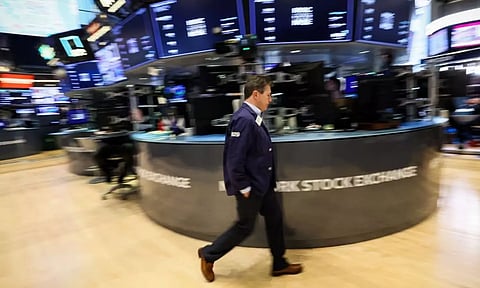

NEW YORK: Wall Street's main indexes finished flat on Thursday, giving up most early gains on milder-than-feared inflation data as investors worried about the U.S. economy's longer-term prospects and whether stocks had further room to run.
Data showed headline and core consumer prices both climbed by 0.2% in July, with the headline number notching annual rise of 3.2% and the core up 4.7%.
In the first hour of trading, the three benchmark indexes advanced more than 1% as traders bet the U.S. Federal Reserve would stop further monetary tightening in 2023 and start cutting interest rates early next year.
Stock prices started to sag from late-morning onwards, and bounced between positive and negative territory for much of the afternoon.
"People looked at the headline number first and we had the big upswing, but as the day went on, the rally faded and that was probably the right reaction," said Gregg Abella, CEO of Investment Partners Asset Management.
He noted that while inflation has slowed, a look beyond the headline number revealed that core inflation remained sticky, and as traders parsed the data, the initial positive sentiment became more subdued.
San Francisco Fed President Mary Daly voiced that cautious tone, saying that while recent inflation data was moving in the right direction, more progress was needed before she would feel comfortable the central bank had done enough.
Thursday's modest gains were only the second positive August day for the S&P 500 (.SPX) and Nasdaq Composite (.IXIC), as investors have used any gains as an opportunity to take profits after five months of advances on both indexes driven by strong growth in big technology stocks.
"A lot of tech valuations are predicated on rates falling, but there is nothing in the numbers, in my mind, to say that we're cutting rates - in fact, we may even see another quarter-point increase before the end of the year," said Abella, noting some big tech valuations were already lofty.
Further rises in these megacaps have also been limited by upward movement on 10-year U.S. Treasuries . The yield on the benchmark note went back above 4% on Thursday after a weak auction of 30-year paper.
Apple (AAPL.O) and Nvidia Corp (NVDA.O) dropped 0.1% and 0.4%, respectively, while Alphabet Inc (GOOGL.O) was flat and Microsoft (MSFT.O) closed at a modest gain.
The Dow Jones Industrial Average (.DJI) rose 52.79 points, or 0.15%, to 35,176.15, the S&P 500 (.SPX) gained 1.12 points, or 0.03%, to 4,468.83 and the Nasdaq Composite (.IXIC) added 15.97 points, or 0.12%, to 13,737.99.
The major S&P sectors were split evenly between those, such as industrials (.SPLRCI) and real estate (.SPLRCR), in negative territory, and climbers including communication services (.SPLRCL).
Energy (.SPNY), among this year's worst performing sectors, posted its sixth straight advance, one shy of the year-best seven consecutive gains it notched between March 23 and April 3.
On the earnings front, Walt Disney (DIS.N) rose 4.9% after beating Wall Street estimates for quarterly adjusted profit per share.
Capri (CPRI.N) surged 55.7% after larger rival Tapestry (TPR.N) said it would buy the Michael Kors parent in an $8.5 billion deal. Tapestry's shares fell 15.9%.
U.S.-listed shares of Alibaba climbed 4.6% after the e-commerce conglomerate reported upbeat quarterly sales on the back of improved consumer sentiment.
Heightening trade worries, President Joe Biden on Wednesday signed an executive order that prohibits some new U.S. investment in China in sensitive technologies such as computer chips and requires government notification for investment in other tech sectors.
Volume on U.S. exchanges was 11.82 billion shares, compared with the 10.95 billion average for the full session over the last 20 trading days.
The S&P 500 posted 18 new 52-week highs and 4 new lows; the Nasdaq Composite recorded 58 new highs and 159 new lows.